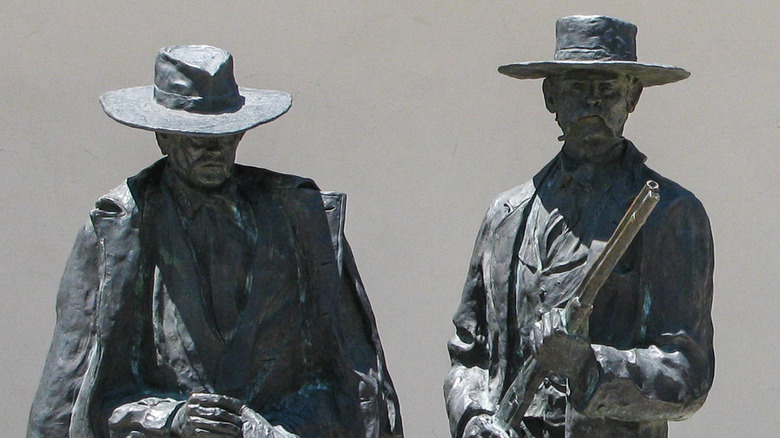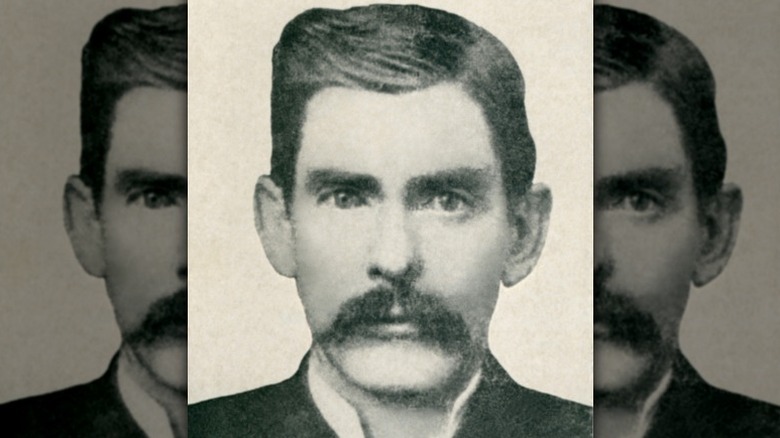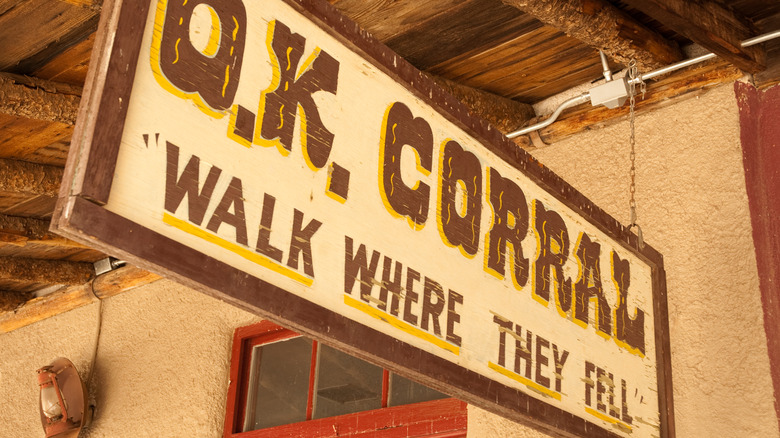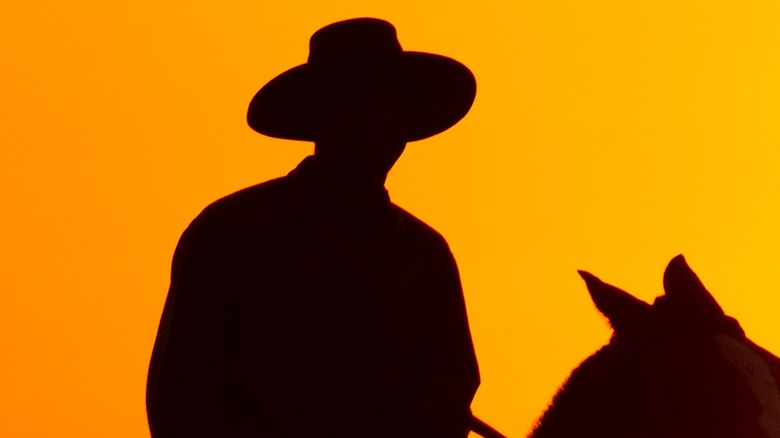The Story Behind Legendary Gunfighter Doc Holliday's Alleged Last Words
If you've ever seen "Tombstone" from 1993 starring Kurt Russel, Val Kilmer, and Sam Elliot, you can probably produce a handful of iconic quotes at the drop of a cowboy hat. The cinematic dramatization of legendary gunslingers Wyatt Earp and Doc Holliday has become something of a modern classic amongst western film lovers and history buffs who don't mind a little bit of creative liberty stirred into the story. While it's only loosely based on real-life events, the film does in fact chronicle the lives of men who actually existed. Doc Holliday, for one, still bears a fascinating and enigmatic reputation that has survived him a century-and-a-half after his death.
According to Biography, John Henry "Doc" Holliday (1851-1887) became a historical figure through his close friendship with Wyatt Earp and their heroic feats at the iconic O.K. Corral shootout on October 26, 1881. If your knowledge of him is restricted to what you've seen in "Tombstone" or other cinematic depictions of his remarkable life, then you may associate him with some famous quotes, such as his signature "I'm your Huckleberry" and his alleged last words, "This is funny." Here's more on the man who uttered such memorable phrases, plus the story behind Doc Holliday's enigmatic final words.
Who was Doc Holliday?
Biography reports that John Henry Holliday was born on August 14, 1851. His father, Henry Burroughs Holliday, was a pharmacist, and his mother, Alice Jane Holliday, looked after him at home with acute care and unabashed maternal love. He was reportedly born with a cleft palate and underwent extensive surgery as a baby to repair the ailment, and while it proved successful, his speech remained mechanically impaired. Alice spent her days working intensely with the boy and passed hours upon hours performing exercises with him to rectify the problem, and by the time he was a toddler, he was speaking normally and living life like any other child.
Alice died from tuberculosis in 1866, and while the loss was emotionally crippling for John, he became infatuated with the phenomenon of medical remedies as a result and reportedly threw himself into his studies. According to History, he graduated from the University of Pennsylvania Dental School in 1872 and officially became a doctor (hence the nickname "Doc"). For a time, his dental practice took precedence over everything, but he moved to Dallas, Texas, at the age of 23 for reasons still unclear to historians. Holliday was forced to flee westward after being charged with murder, and upon arriving in Dodge City, Kansas, he met former lawman Wyatt Earp and developed a close friendship with him (per Biography).
The OK Corral shootout
Shortly after meeting Wyatt Earp, Holliday followed him to Tombstone, Arizona, to start a new life. It was there that the infamous shootout at the O.K. Corral took place on October 26, 1881. Earp, whose brother Virgil was the town marshal, restored a semblance of order to Tombstone alongside Virgil, his other brother Morgan, and his friend Doc Holliday. However, according to History, a power struggle soon developed between the team of gunslingers and a sect of rogue cowboys known as the Clanton-McLaury gang, who was known to terrorize the town.
It all came to a head on the afternoon of October 26 when the Earps — alongside Holliday — drew guns against Billy Clanton, Frank McLaury, and several other members of their gang behind the O.K. Corral. Per True West Magazine, the shootout lasted a grand total of 30 seconds, though the flurry of gunfire and blood that enraptured the town within that short window of time was enough to inspire epic stories for all years to come.
Most of the Clanton-McLaury gang was wiped out during the confrontation (Ike Clanton and Billy Claiborne reportedly escaped), and the Earp team sustained numerous injuries. Holliday and the Earp brothers were reportedly charged with murder after the fact, though they were acquitted when Tombstone's judge declared them "fully justified in committing these homicides" a month later (per History).
Doc Holliday's final words
Doc Holliday later parted ways with his friend Wyatt Earp and moved to Glenwood Springs, Colorado, a few years before his death. Like his late mother, Holliday tragically developed tuberculosis, and it was only getting worse with every passing year (via Biograpghy). According to Visit Glenwood Springs, Holliday was bedridden at the Hotel Glenwood when he died on November 8, 1887, just after purportedly uttering his final words, "This is funny."
For such a historical figure of the Old West, it's not surprising that Doc Holliday has his fair share of legend. Per stories passed down, Holliday had always told his friends that he was destined to die in a haze of bullets like a true gunslinger, though as the waning days brought him closer and closer to the threshold between life and death, it became quite apparent that it wasn't going to happen that way.
Doc Holliday's alleged last words, "This is funny," were sort of a sardonic remark on the situation, and while he didn't necessarily die staring down the barrel of an enemy gun, he did die staring death straight in the face and laughing all the while. Another possible explanation that puts Holliday's final words into context is that he had believed he would die with his boots on (via Visit Glenwood Springs); hence, his deathbed scene in "Tombstone" that portrayed Holliday looking down at his bare feet before laughing to himself and saying, "I'll be damned ... This is funny."



